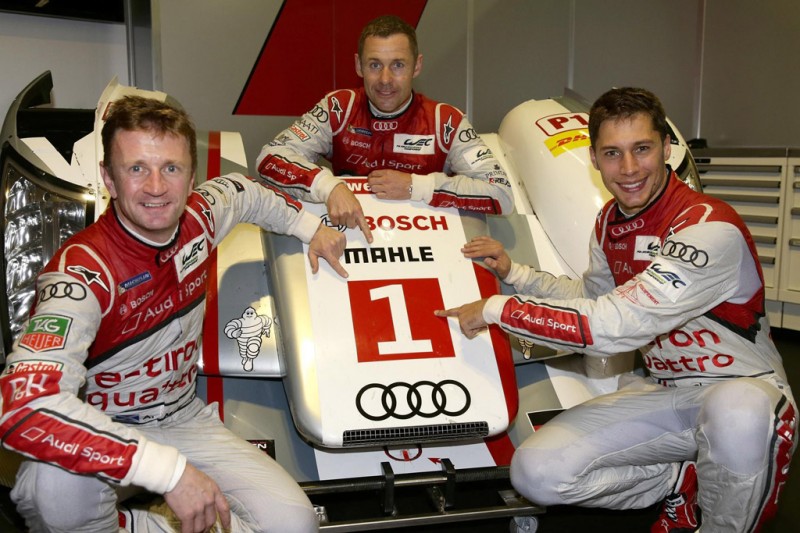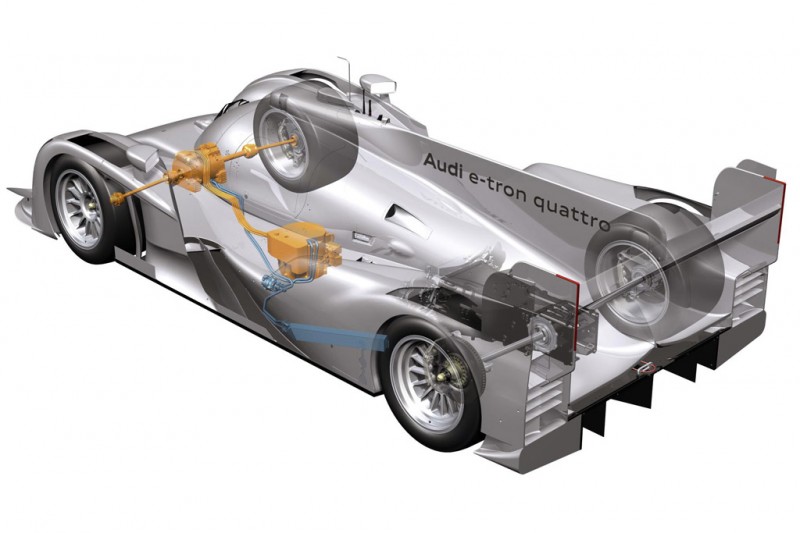Audi’s pioneering hybrid-diesel technology has provided Britain with the nation’s first sportscar world champion for 21 years.
Dumfries-born Allan McNish who won this year’s Le Mans 24 Hours for a third time was “crowned” the FIA World Endurance Champion in China last weekend (9 Nov).
McNish plus co-drivers Tom Kristensen (Den) and Loïc Duval (F) have swept their Audi R18 e-tron quattro to three victories plus three second and one third placing in the seven WEC races run to date.
Audi has also already retained the WEC Manufacturers’ title with the R18 e-tron quattro unbeaten in any WEC race that ran “green flag” racing laps this season with only the Six Hours of Bahrain remaining (30 Nov).
Audi continues to make history – and not for the first time. The victory of the R18 e-tron quattro in 2012 made Audi the first manufacturer to win the Le Mans 24 Hours with hybrid drive.
These recent successes have set the next technological milestone as the victory of hybrid drive continues a long list of top-calibre technical and sporting achievements.
These originated with quattro all-wheel drive in rallying, followed by FSI petrol direct injection and ultimately the diesel revolution at the 2006 Le Mans with TDI (turbo diesel) power in sportscar racing.
Twelve wins at the Le Mans 24 Hours and in the Sebring 12 Hours, nine American Le Mans Series titles, two FIA World Endurance Championship titles (both Driver’s & Manufacturers’ each year) have been accomplished since Audi’s 1999 debut in the category.
No other car manufacturer has shaped the sports-prototype scene in the last decade like Audi. The 3.7-litre V6 turbo diesel R18 e-tron quattro made its race debut in May 2012 and has gone on to win 10 races despite running with a fuel tank a significant 15 litres smaller than its main hybrid-petrol rival since June.
Additionally regulations restrict the Audi using its hybrid below 120kph while hybrid-petrol cars can use its hybrid from standstill – a significant advantage on the eight-race WEC calendar this year on tracks featuring tighter corners.
For example, around the 3.39-mile Shanghai track last weekend (9 Nov), there were five corners under 120kph but Audi still triumphed.
Through the intelligent combination of a conventionally powered rear axle with an electrically powered front axle, the R18 is transformed briefly at regulated points around a circuit into an e-tron quattro – the first Audi race car not to be exclusively powered by an internal combustion engine.
The system located in the front of the car consists of two drive shafts and a motor generator unit (MGU) including a gear mechanism that is supplied with energy by the electric flywheel accumulator mounted alongside the driver in the cockpit. It is charged by the MGU during braking and returns its energy to the MGU under acceleration.
The many lessons learned in bringing the remarkable R18 e-tron quattro to the race circuit are being applied in the development of the first road-going plug-in Audi hybrid – the Audi A3 Sportback e-tron – which is due to join the range in the UK in late 2014. Capable of running exclusively on electric power for up to 31 miles at speeds of up to 80mph, the new petrol-electric hybrid offers the prospect of 188mpg fuel economy* combined with all the other practical, technological and stylistic attributes that have already made the A3 Sportback such a great success.
The A3 Sportback e-tron can be powered by its 1.4-litre TFSI petrol engine alone, or deploy the engine and the electric motor simultaneously to generate 204PS, good for 0-62mph in 7.6 seconds and a top speed of 138mph. The motor’s input increases the range to up to 584 miles, and depending on operating conditions can pare back emissions to as little as 35g/km*.
* According to the New European Driving Cycle (NEDC) test


